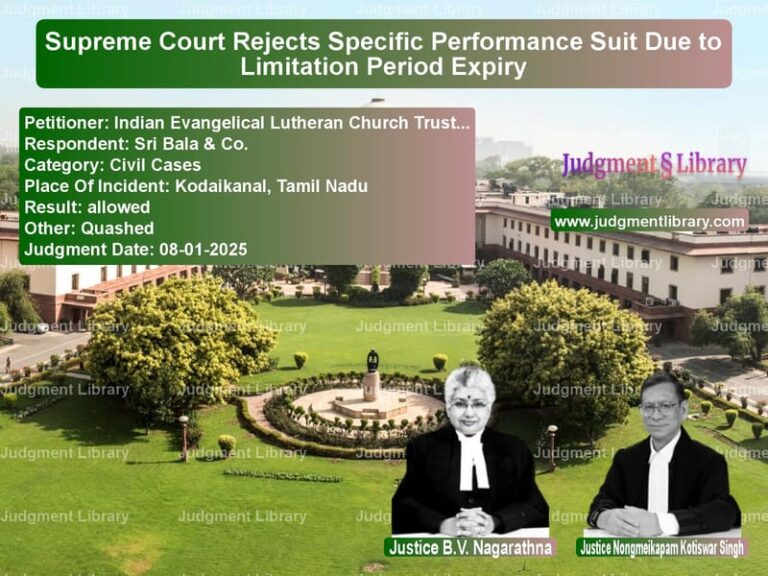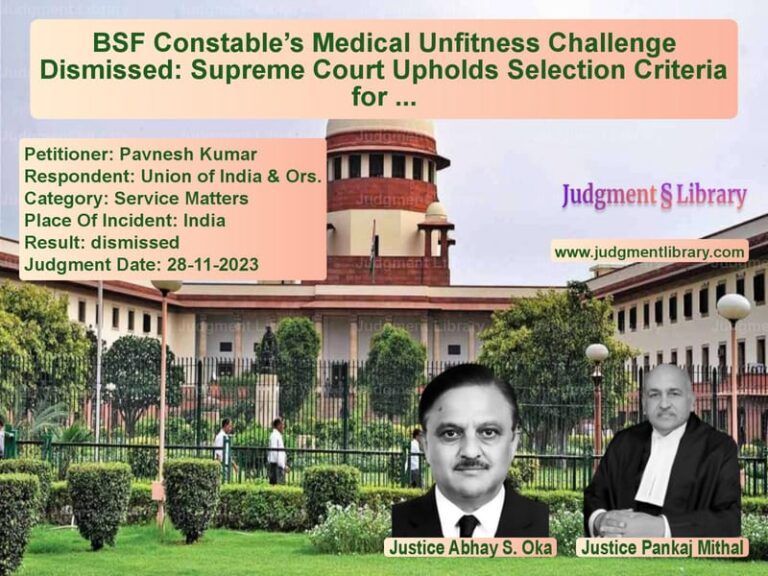Supreme Court Dismisses Appeals on Erroneous Appointments in Maharashtra Government Jobs
The case of Shankar vs. The State of Maharashtra and connected appeals brought before the Supreme Court involved a critical issue concerning government job appointments based on erroneous merit lists. The appellants, who had been appointed due to a mistake in the compilation of merit lists, challenged the subsequent cancellation of their appointments by the state authorities. The Supreme Court upheld the cancellation, emphasizing that government appointments must adhere strictly to merit and eligibility criteria.
Background of the Case
The case stemmed from government job appointments in Maharashtra, where the appellants were initially selected based on official merit lists. However, upon verification of records, it was discovered that they did not meet the required eligibility criteria, leading to the cancellation of their appointments. The appellants subsequently challenged this decision in the courts, arguing that they had a legitimate right to continue in service.
The key issues in the case included:
- Whether the cancellation of appointments due to errors in the merit list was legally valid.
- Whether the appellants had acquired a vested right to continue in their positions despite the mistake.
- Whether due process was followed in the verification and cancellation process.
Legal Precedents and Framework
The case was closely linked to the principle of merit-based selection in public employment. The Supreme Court has, in multiple rulings, upheld that government job appointments must strictly follow eligibility criteria. In previous cases, the Court has emphasized that:
- Mistaken appointments do not confer a vested right to continue in service.
- Authorities have a duty to correct errors in the selection process.
- Appointments based on false or mistaken information must be revoked to maintain the integrity of public employment.
Petitioner’s Arguments
The appellants, represented by their legal counsel, contended that:
- They were lawfully appointed based on the official merit list and had no reason to doubt its accuracy.
- The cancellation of their appointments was arbitrary and lacked due process.
- Since they had already been serving in their respective positions for a considerable period, they had acquired a legitimate right to continue in service.
- The authorities failed to notify them properly about the errors and provide them with an adequate opportunity to present their case before cancellation.
Respondent’s Arguments
The State of Maharashtra, represented by the respondents, countered these arguments, stating that:
- The appointments were made based on incorrect records, and verification revealed that the appellants did not meet the required eligibility criteria.
- The state government has a duty to ensure that only eligible candidates are appointed to government posts.
- Allowing the appellants to continue in service despite their ineligibility would be unfair to genuinely eligible candidates who were deprived of appointment due to the mistake.
- The corrections made in the merit list were lawful and necessary to maintain fairness and transparency in government recruitment.
Supreme Court’s Observations
The Supreme Court, led by Justices Kurian Joseph and R. Banumathi, upheld the decision of the High Court, which had affirmed the cancellation of appointments based on verification of records.
The Court made several key observations:
- The appointments of the appellants were made due to a mistake in the merit list.
- Upon verification, it was clear that the appellants did not meet the eligibility criteria for their respective positions.
- The state government acted within its rights to correct the mistake and ensure that only eligible candidates were employed.
- The appellants had no vested right to continue in service based on an erroneous appointment.
- The principles of fairness and transparency in public employment required that errors in recruitment be rectified, even if they were discovered after the appointments had been made.
The Court stated:
“The appointment already offered to them was on a mistake of fact, which has only been corrected on verification of the records.”
Final Judgment
The Supreme Court dismissed the appeals and upheld the cancellation of appointments. The key rulings included:
- The appellants were not entitled to continue in their positions.
- The corrections made by the state authorities were lawful and justified.
- No costs were imposed on the appellants, but they had no claim to reinstatement.
Implications of the Judgment
The ruling reinforces several key principles regarding government appointments:
- Government job appointments must be strictly based on merit and eligibility.
- Errors in the selection process must be corrected, even if the candidates have already been appointed.
- Appointments made due to administrative mistakes do not confer a vested right to continue in service.
- Ensuring fairness in public employment requires that recruitment errors be rectified transparently.
Conclusion
This case serves as an important precedent for future disputes involving erroneous appointments in government services. The Supreme Court’s ruling affirms the principle that merit and eligibility must be strictly adhered to in public employment, and mistakes in recruitment processes must be corrected to maintain the integrity of government institutions.
Don’t miss out on the full details! Download the complete judgment in PDF format below and gain valuable insights instantly!
Download Judgment: Shankar vs The State of Maharas Supreme Court of India Judgment Dated 07-11-2017.pdf
Direct Downlaod Judgment: Direct downlaod this Judgment
See all petitions in Recruitment Policies
See all petitions in Public Sector Employees
See all petitions in Termination Cases
See all petitions in Judgment by Kurian Joseph
See all petitions in Judgment by R. Banumathi
See all petitions in dismissed
See all petitions in supreme court of India judgments November 2017
See all petitions in 2017 judgments
See all posts in Service Matters Category
See all allowed petitions in Service Matters Category
See all Dismissed petitions in Service Matters Category
See all partially allowed petitions in Service Matters Category







